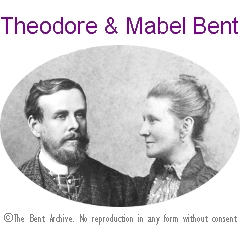We left last time Mabel and Theodore on Syros, 2 December 1883, waiting for the m/v Ydra to take them to Serifos. Their explorations there were limited and by the 4th they were ready to find a caique to take them down the line to Sifnos. From there they sailed to the islet of Kimolos for Milos. From there, via Syros, on Sunday 16th December, they arrived on Paros and made immediately for Antiparos (18th December), where they met Robert Swan, a British engineer employed locally in emery mining. (Swan was to become a lifelong friend, travelling with the Bents to Zimbabwe in 1891.) Mabel records that Swan had found some archaeological remains on Antiparos and Theodore at once asks if he might excavate them. This piece of luck, like so much in his career, was to help make Theodore’s reputation as an ‘archaeologist’ – he was completely untrained, self-taught would be a charitable description, and had never before in his life had access to such valuable and important archaeological material. His later account for the Journal of Hellenic Studies (1884, Vol. 5, 42-59) was to contribute to the recognition of a distinct ‘Cycladic Culture’. (Details of all this, of course, may be read in the full published version of Mabel’s Chronicles.)
Subsequently the couple return to Paros and by Christmas Eve, 1883, they are on Naxos.
Mabel begins her chronicle for Christmas Day with an ‘apology’ for having neglected her writings, however, her chronicle tracks back to cover those lost days. But let’s let Mabel take us on from here in her own words:
Next morning we went in a tram drawn by horses up to the quarry of marble with a Belgian and a Greek belonging to the French company who work it. The road is so steep that no horses are needed for the descent. We were received by the engineer who took us down the quarry. We all had miners’ lamps, not very light to hold, and scrambled and slipped and crawled through the various passages up and down. When I saw the plan of where I had been I had no idea how many ramifications we had been through. At the entrance is a bas-relief of figures dedicated to the Nymphs. It is carefully covered with wood. The middle figures have been removed by someone. It is a bright brown colour.
P of course would not go down either, or at Antíparos. We lunched at the engineer’s house. The Belgian promised me a little lamp found in the quarries but this I still look on as a bird in the bush. Then we mounted mules and rode 3 hours about to Levkés up in the mountains. The Demarch received us kindly for the sake of Mr. Swan who had helped at his election and after visiting the new and very hideous church where, however, one gets a lovely sea view. We settled down to dinner and after it a dance. The Demarch did this really out of hospitality, for next day he said the 10 frs. T gave him was far more than he had spent and really had to be pressed to take it, and not from philoxenía which is never satisfied with anything. Some time the host refuses loftily to take anything but leads us to understand he does not answer for his wife and she always takes it.
Sunday [December] 23rd. Rode to Naussa, a very small poor village in an immense and very safe bay. Lunched there and embarked in a sailing kaïke for Naxià, the capital of this island. An excellent passage. Christmas Eve was a lovely day and we did nothing but wait to see the steamer come in with such a crowd round us on the beach, where we sat on two chairs like King Canute, that the police had to drive them away. And row to a little island, now much diminished by the waves where there are the ruins of a temple to Bacchus lie [sic], only the lintel and 2 door posts stand and have been kept white by wind and spray. T was getting worse and worse with a sore throat. Mr. Tcherlendi came by the steamer. Christmas Day was a downpour and as our rooms are not watertight came in through doors and windows. The wind howled and our prospects of food were faint.A wild duck that was found just before luncheon cheered us however so much that we ate it all but a wing, which I prudently cut off to keep. We thought something must turn up for dinner, but when dinner-time came, I can’t say dinner, and T was in bed eating arrowroot and I was supposed to be dining tête-à-tête with P, I felt so dejected that I could only silently drink T’s health and think ‘the fewer the better fare’. They had boiled the duck’s skeleton with much water and rice and the skeleton came up as a dish with the cold bit which we divided. I went and made some arrowroot for myself and fervently prayed that I might ever after be glad and thankful for a good Christmas dinner.
